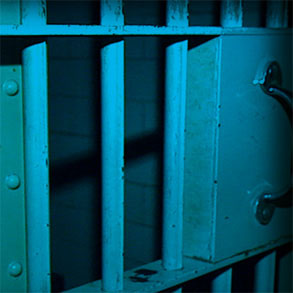The metal detector goes off for the fifth time. The officers remove my 80-year-old grandmother’s shoes and belt, ushering her into a private room for a thorough strip-search. This humiliating process verifies what I’ve been telling them all along: She has a metal hip. We pass the rest of the inspection, our hands are stamped with invisible ink and we proceed through three thick steel gates. As I step forward to check in with the next guard, my grandmother retreats to the bathroom to compose herself.
I have visited maximum-security prisons for 17 years and become acquainted with a soft-spoken guard named Jennings, who also happens to be an internationally ranked chess player. Although what I know about his everyday role as a correctional officer is vividly engraved in my mind, I talk to him easily. We chat about his son’s accomplishments before he picks up a house phone to call for prisoner 83A6158.
As my grandmother approaches, Jennings jots down the names of two chess books and a Web site for me to carry back to my high school club. Nodding goodbye, my grandmother and I hold out our hands and the translucent ink glows faintly under the ultraviolet light. Jennings unlocks another gate, the final obstacle in our three-hour odyssey. I’m in prison again.
Inmate 83A6158 is my father. Both my biological parents have been serving life sentences since I was 14 months old. After their arrest I was adopted by their friends, my other parents, who already had two children, my brothers. This visit may be my grandmother’s last. I remember when she took care of me; now I steady her while we walk.
As we enter the loud, crowded visiting room, I rush my father. Our embrace is restricted by the wide table separating us, but it’s great to feel his powerful arms around me. Usually my father is delighted when he sees me but today his eyes are sad. His best friend in prison has died of AIDS. Although prison deaths are common, this untimely news casts a pall.
As we talk, my attention is drawn to the families around us: crying newborn babies, couples huddling for privacy, men and boys playing silent games of checkers. The remaining hours pass too quickly and soon Jennings’ voice, made harsh by his callous task, drones over the intercom that visiting hours are over.
The goodbye ritual is wrenching, and leaves us slightly self-conscious. While my grandmother and I move back through the labyrinth of gates and buildings, it is my father’s turn to be strip-searched, normal procedure after any visit.
Many hours later, I walk in my front door. I’m home again. As I exchange hugs with my brothers, the phone rings. The automated voice recites a message I know by rote: “Hello, you have a collect call from a New York state correctional facility. If you will pay, press 5 now.” It’s my father, checking in, glowing from our time together.
I see prisons all around me. Tasting the cool water of a river, stretching out on a double bed, racing to school — in some measure my freedom must compensate for their imprisonment. Every day I combine two lives: one immersed in the stability of privilege and the other meeting the challenges of degradation.
Oddly enough, wrestling with these worlds has extended my vision and generated a plethora of possibilities. I make choices judiciously. Tenacity and diligence are my allies.

